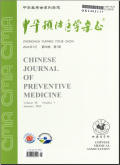变应性鼻炎及哮喘的严重程度及用药对新型冠状病毒感染的影响
Influence of the severity and treatment of allergic rhinitis and asthma on SARS-CoV-2 infection
摘要由新型严重急性呼吸系统综合征冠状病毒2型(SARS-CoV-2)所致的2019年冠状病毒肺炎(COVID-19)已造成 6.6亿人感染,670万人死亡。目前已确定了多种与COVID-19病情严重度相关的危险因素,但变应性鼻炎与哮喘是否会对新型冠状病毒感染造成影响尚存在争议。总体而言,没有充足的证据支持变应性鼻炎或哮喘是增加新型冠状病毒感染率或使病情加重的危险因素,甚至有研究显示,特应性可能是减轻新冠病毒感染的保护因素,这与具备特应性的个体中SARS-CoV-2 进入细胞所需的受体血管紧张素转换酶2的表达减少有关。本文就变应性鼻炎及哮喘的严重程度及用药对新型冠状病毒感染的影响进行综述,以期为制定 COVID-19 的预防、风险分层和治疗策略提供参考依据。
更多相关知识
abstractsCoronavirus disease 2019 (COVID-19) caused by severe acute respiratory syndrome coronavirus 2 (SARS-CoV-2) has affected 660 million people and resulted in 6.7 million deaths. At present, a variety of risk factors related to the severity of COVID-19 have been identified, but whether allergic rhinitis and asthma will affect SARS-CoV-2 infection remains controversial. In general, there is no sufficient evidence to support that allergic rhinitis or asthma is a risk factor for increasing the rate of SARS-CoV-2 infection or aggravating the disease. Some studies even show that atopy may be a protective factor to alleviate SARS-CoV-2 infection, which is related to the decreased expression of angiotensin-converting enzyme 2, the receptor required for SARS-CoV-2 to enter cells, in atopic individuals. This paper reviews the influence of the severity and treatment of allergic rhinitis and asthma on SARS-CoV-2 infection, in order to provide some references for establishing strategies for prevention, risk stratification and treatment of COVID-19.
More相关知识
- 浏览44
- 被引2
- 下载5


相似文献
- 中文期刊
- 外文期刊
- 学位论文
- 会议论文



 换一批
换一批 换一批
换一批



